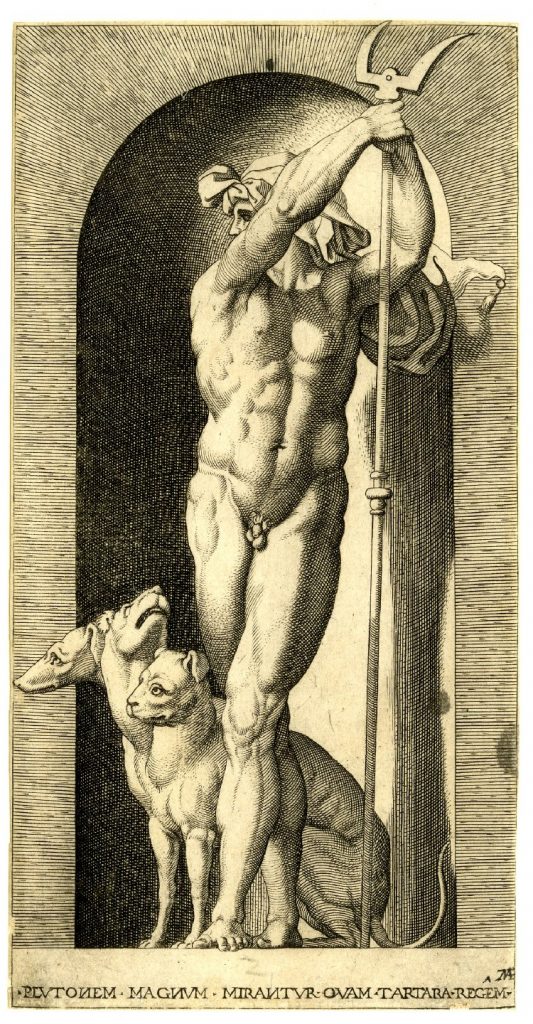More often than not, ancient Greek mythology (religion) served to explain a series of legends. Different from modern religions such as Christianity, Judaism, or Islam, ancient Greek religion was an anthropomorphic polytheism, meaning that ancient Greeks believed in a multitude of individual divine figures that took on human forms and emotions.1 Furthermore, ancient Greek mythology lacked much of the asceticism and mystical enthusiasm that is more commonly seen in modern religions. Most of the highly developed anthropomorphic and comparative rationalism of the ancient Greek religious thought can be accredited to Homer with the aid of his Iliad and Odyssey.2
The people of the ancient Greek civilization were often in a state of weakness under the power of nature; therefore, they relied heavily on the divine individuals of Olympus. Why? They believed that the forces of nature were under the control of their gods. In short, the relationship between humans and divine beings was that of a retribution justice.3 If humans did anything to offend the gods, then those gods would strike back in some sort of fashion to restore justice.4 Therefore, humans were constantly looking to please the gods in fear of their wrath.
Out of the ancient Greek mythology came the god of the dead and the underworld, Hades. Hades had five other siblings: Zeus, Poseidon, Demeter, Hera, and Hestia, and they were all children of Cronus and Rhea.5 After defeating their parents (the Titans), Hades drew lots with Zeus and Poseidon to gain their respective domains. Hades was commonly thought to be a cold god, but he was never considered to be an evil divine figure. Furthermore, it is important to note that his realm, the underworld, should not be associated with the hell of Christianity.6 However, Hades was for the most part feared by all. Another name for the ancient Greek god was Ploutos and later adopted by the Romans as Pluto.7

The god of the underworld was the husband of Persephone (Zeus’s and Demeter’s daughter). Although she was Hades’ wife, she only lived with him during the winter time.8 Persephone was the divine goddess of agriculture and fertility. Therefore, the ancient Greeks accredited the change in nature (winter) to Persephone moving to the underworld. Persephone was unable to stay with Hades at all times due to interference from her mother Demeter. Zeus, however, was okay with the marriage of Hades and Persephone. Therefore, in order to set up the marriage, Zeus had to trick Persephone, so she could be abducted by Hades.9 However, Demeter interfered, and that is why Persephone spends half of the year with Demeter and the other half with Hades.
Furthermore, it is important to note the Greek perspective of the afterlife. Perspectives about the afterlife varied from each other based on their region in Greece as well as their time period in Greek history. The consensus was that the underworld was neither heaven nor hell.10 The sense that exists within Christianity, for example, was not present during the time of the ancient Greeks. Although Tartarus was present as a location within the underworld, the Greeks would not compare it to the equivalent of Christian hell. The way the Greeks saw it, the underworld was a place that everyone ended up after death.11 However, there were a few, including the philosopher Epicurus, that believed that the underworld did not exist at all. He believed that when the body died, the soul died with the body as well.12 A good portion of Greeks refused to believe such a pessimistic perspective of the afterlife. However, even the Greek traditional perspective of the underworld was not as popular despite many Greeks believing in it.
- Funk & Wagnalls New World Encyclopedia, 2016 s.v., “Greek Religion and Mythology.” ↵
- Funk & Wagnalls New World Encyclopedia, 2016 s.v., “Greek Religion and Mythology.” ↵
- Funk & Wagnalls New World Encyclopedia, 2016 s.v., “Greek Religion and Mythology.” ↵
- Funk & Wagnalls New World Encyclopedia, 2016 s.v., “Greek Religion and Mythology.” ↵
- Salem Press Encyclopedia, January, 2015, “Hades (deity),” by Joseph, Michael, DMin. ↵
- Salem Press Encyclopedia, January, 2015, “Hades (deity),” by Joseph, Michael, DMin. ↵
- Salem Press Encyclopedia, January, 2015, “Hades (deity),” by Joseph, Michael, DMin. ↵
- Salem Press Encyclopedia, January, 2015, “Hades (deity),” by Joseph, Michael, DMin. ↵
- Salem Press Encyclopedia, January, 2015, “Hades (deity),” by Joseph, Michael, DMin. ↵
- The Greenhaven Encyclopedia of Ancient Greece, 2007, s.v. “Underworld,” by Robert B. Kebric. ↵
- The Greenhaven Encyclopedia of Ancient Greece, 2007, s.v. “Underworld,” by Robert B. Kebric. ↵
- The Greenhaven Encyclopedia of Ancient Greece, 2007, s.v. “Underworld,” by Robert B. Kebric. ↵



186 comments
Natalia Flores
This article helped clear up some misconceptions between Christianity and Greek religion such as the Underworld being the equivalent to Hell. What struck me though is that it wasn’t a popular notion even though it was a part of the Greek religion. I could see why people could see Hades as an evil or bad God since he was the equivalent of death. Along with the misconception that the Underworld is Hell, it just really paints Hades as the bad guy even though he fell into that position by coincidence.
Christopher King
I think this article clears up a number of misconceptions about Hades and the Underworld with the Greek society. Much of how it is perceived is from the religion of Christianity and that is what gave us the thought of fire and suffering after death. I did not realize that the Greeks had rejected the idea and that there was other Greeks that contested the idea of an underworld. Hades seems like he was the little unpopular brother out of the family who got the raw end of the deal.
Hector Garcia
Overall, I thought the introduction of the character’s backstory was really interesting. What caught my attention was the story of how Hades tricked Persephone to be his wife. Another important aspect was that Persephone was with Hades only during the winter and Greeks mainly correlate this with lack of harvests. This article is intriguing because it doesn’t capture Hades as an evil deity that most people relate to him.
Destiny Flores
Hades is such a well known God in Greek mythology. It’s interesting how far stories such as this coiled into cultures. These stories were people’s way of explaining such complex topics such as religion and the weather. I find it rather odd, how hades is portrayed to be another image of the devil and his domain is hell. However, that’s clearly not the case at all.
Angelica Padilla
I’ve always enjoyed reading about greek mythology. But I don’t think I’ve gotten deep into reading about hades. It is interesting how they didn’t think of heaven and hell like Christianity, or consider Hades as the devil. The article was great to read through, and great at explaining the ‘religion’ view of Greek Gods. I always thought the underworld was a comparison of the hell Christian view, as well as Hades being considered as the bad person and related to sin.
Evian-loren Salgado
This was a very interesting article as I love Greek Mythology. I think the author did well with the details about Hades as well as the fact the author went into the detail explaining the underworld and comparing the Greeks underworld to that of what Christians believe. The author also went into detail talking about Hades wife Persephone and why she only spends half a year with him. Overall this was a very good and well written article.
Joshua Castro
I have always been a fan of Greek mythology due to how fascinating and intriguing it can be! I really enjoyed this article because of this! Through this article I was able to learn some things that I did not know about before such as Persephone being the daughter of Zeus and that many of the perspectives on the afterlife varied based on the region of Greece!
Timothy ODekirk
I am a huge fan of Greek mythology and all of those stories about the Greek gods. I found it interesting how many of the ancient Greeks believed in the afterlife as something that everyone goes to when they die, not just a place for sinful people. I also was intrigued by the images of Hades during that time. I liked the image because it depicted Hades in a different way than he is depicted today in the modern world. Today Hades is depicted as this evil monster along with his guard dog Cerberus, who in the title image, just looks like an average dog with three heads. This was an interesting article overall and I love Greek mythology.
Belia Camarena
I have always enjoyed reading about Greek mythology because the legends are often fascinating. As a result, I enjoyed reading this article, and I was surprised especially by the story of Persephone. She was forced into her marriage, and it was only by the works of her mother that she got to escape the underworld for half a year. I found it interesting that the Greeks attributed the change in seasons to Persephone’s location.
Timothy O'Dekirk
I am a huge fan of Greek mythology and all of those stories about the Greek gods. I found it interesting how many of the ancient Greeks believed in the afterlife as something that everyone goes to when they die, not just a place for sinful people. I also was intrigued by the images of Hades during that time. I liked the image because it depicted Hades in a different way than he is depicted today in the modern world. Today Hades is depicted as this evil monster along with his guard dog Cerberus, who in the title image, just looks like an average dog with three heads. This was an interesting article overall and I love Greek mythology.